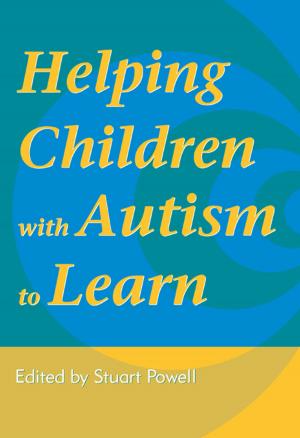Promiscuous Feminist Methodologies in Education
Engaging Research Beyond Gender
Nonfiction, Reference & Language, Education & Teaching| Author: | ISBN: | 9781317609940 | |
| Publisher: | Taylor and Francis | Publication: | April 14, 2016 |
| Imprint: | Routledge | Language: | English |
| Author: | |
| ISBN: | 9781317609940 |
| Publisher: | Taylor and Francis |
| Publication: | April 14, 2016 |
| Imprint: | Routledge |
| Language: | English |
The book marks the circulation of the term "promiscuous feminist methodology" and registers its salience for educational researchers who risk blundering feminist theories and methodologies in chaotic and unbridled ways. The sexism embedded in language is what makes the notion of promiscuous "feminists gone wild" tantalizing, though what the book puts forth is how the messy practice of inquiry transgresses any imposed boundaries or assumptions about what counts as research and feminism. What can researchers do when we realize that theories are not quite enough to respond to our material experiences with people, places, practices, and policies becoming data? As a collection, the book provides how various theories researchers put to work "get dirty" as they are contaminated and re-appropriated by other ways of thinking and doing through (con)texts of messy practices. In this way, gender cannot simply be gender and promiscuous feminist methodologies are always in-the-making and already ahead of what we think they are.
This book was originally published as a special issue of the International Journal of Qualitative Studies in Education.
The book marks the circulation of the term "promiscuous feminist methodology" and registers its salience for educational researchers who risk blundering feminist theories and methodologies in chaotic and unbridled ways. The sexism embedded in language is what makes the notion of promiscuous "feminists gone wild" tantalizing, though what the book puts forth is how the messy practice of inquiry transgresses any imposed boundaries or assumptions about what counts as research and feminism. What can researchers do when we realize that theories are not quite enough to respond to our material experiences with people, places, practices, and policies becoming data? As a collection, the book provides how various theories researchers put to work "get dirty" as they are contaminated and re-appropriated by other ways of thinking and doing through (con)texts of messy practices. In this way, gender cannot simply be gender and promiscuous feminist methodologies are always in-the-making and already ahead of what we think they are.
This book was originally published as a special issue of the International Journal of Qualitative Studies in Education.















